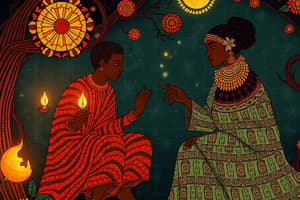Podcast
Questions and Answers
What is the primary purpose of NAIDOC Week celebrations?
What is the primary purpose of NAIDOC Week celebrations?
- To recognize the contributions of non-Indigenous Australians to Indigenous cultures
- To promote the economic development of Indigenous communities
- To commemorate the arrival of British colonizers in Australia
- To celebrate the achievements and cultures of Aboriginal and Torres Strait Islander peoples (correct)
During which time period did the forced removal of Indigenous children from their families occur?
During which time period did the forced removal of Indigenous children from their families occur?
- 1800s to 1900s
- Late 1800s to 1970s (correct)
- 1950s to 1980s
- 1900s to 1950s
What is the estimated duration of Indigenous Australian presence on the continent?
What is the estimated duration of Indigenous Australian presence on the continent?
- At least 40,000 years
- At least 100,000 years
- At least 10,000 years
- At least 65,000 years (correct)
What is the main goal of the Uluru Statement from the Heart?
What is the main goal of the Uluru Statement from the Heart?
What event occurred in 1788 that significantly impacted Indigenous Australians?
What event occurred in 1788 that significantly impacted Indigenous Australians?
What is the name of the organization that aims to promote understanding, respect, and justice for Indigenous Australians?
What is the name of the organization that aims to promote understanding, respect, and justice for Indigenous Australians?
How many distinct Indigenous languages were spoken in Australia before colonization?
How many distinct Indigenous languages were spoken in Australia before colonization?
What is the significance of the 1967 Referendum in Indigenous Australian history?
What is the significance of the 1967 Referendum in Indigenous Australian history?
Flashcards are hidden until you start studying
Study Notes
NAIDOC Week Celebrations
- NAIDOC Week is a national celebration of Aboriginal and Torres Strait Islander peoples, cultures, and histories
- Held annually from the first Sunday in July to the following Sunday
- The week is a time for Indigenous Australians to come together and share their stories, cultures, and achievements
- Events and activities during NAIDOC Week include:
- Cultural performances and festivals
- Art exhibitions and displays
- Traditional food and craft workshops
- Community gatherings and BBQs
- Flag-raising ceremonies
- Awards and recognition programs
Indigenous Australian History
Pre-Colonial Era
- Indigenous Australians had been living on the continent for at least 65,000 years, with some estimates suggesting up to 80,000 years
- There were over 250 distinct Indigenous languages and more than 600 different clans and language groups
- Traditional practices and customs varied greatly between regions and clans
- Indigenous Australians had a deep spiritual connection with the land and believed in a complex network of ancestral beings and dreaming tracks
Colonization and Dispossession
- In 1788, British colonization of Australia began, leading to the forced removal of Indigenous Australians from their lands
- Many Indigenous Australians were killed, displaced, or forced into missions and reserves
- The Stolen Generations, a period of forced removal of Indigenous children from their families, lasted from the late 1800s to the 1970s
- Indigenous Australians were denied basic rights and citizenship until the 1967 Referendum, which allowed the Federal Government to make laws for Indigenous people and include them in the national census
Modern-Day Issues and Reconciliation
- Indigenous Australians still face significant disparities in health, education, and economic outcomes compared to non-Indigenous Australians
- The Uluru Statement from the Heart, released in 2017, calls for constitutional recognition and a voice to parliament for Indigenous Australians
- Reconciliation efforts, such as the Reconciliation Australia organization and the National Apology to the Stolen Generations, aim to promote understanding, respect, and justice for Indigenous Australians
NAIDOC Week Celebrations
- NAIDOC Week is an annual national celebration of Aboriginal and Torres Strait Islander peoples, cultures, and histories, held from the first Sunday in July to the following Sunday.
- The week is a time for Indigenous Australians to share their stories, cultures, and achievements through various events and activities.
- Events and activities include cultural performances and festivals, art exhibitions and displays, traditional food and craft workshops, community gatherings and BBQs, flag-raising ceremonies, and awards and recognition programs.
Indigenous Australian History
Pre-Colonial Era
- Indigenous Australians had been living on the continent for at least 65,000 years, with some estimates suggesting up to 80,000 years.
- There were over 250 distinct Indigenous languages and more than 600 different clans and language groups.
- Traditional practices and customs varied greatly between regions and clans.
- Indigenous Australians had a deep spiritual connection with the land and believed in a complex network of ancestral beings and dreaming tracks.
Colonization and Dispossession
- British colonization of Australia began in 1788, leading to the forced removal of Indigenous Australians from their lands.
- Many Indigenous Australians were killed, displaced, or forced into missions and reserves.
- The Stolen Generations, a period of forced removal of Indigenous children from their families, lasted from the late 1800s to the 1970s.
- Indigenous Australians were denied basic rights and citizenship until the 1967 Referendum, which allowed the Federal Government to make laws for Indigenous people and include them in the national census.
Modern-Day Issues and Reconciliation
- Indigenous Australians still face significant disparities in health, education, and economic outcomes compared to non-Indigenous Australians.
- The Uluru Statement from the Heart, released in 2017, calls for constitutional recognition and a voice to parliament for Indigenous Australians.
- Reconciliation efforts, such as the Reconciliation Australia organization and the National Apology to the Stolen Generations, aim to promote understanding, respect, and justice for Indigenous Australians.
Studying That Suits You
Use AI to generate personalized quizzes and flashcards to suit your learning preferences.




